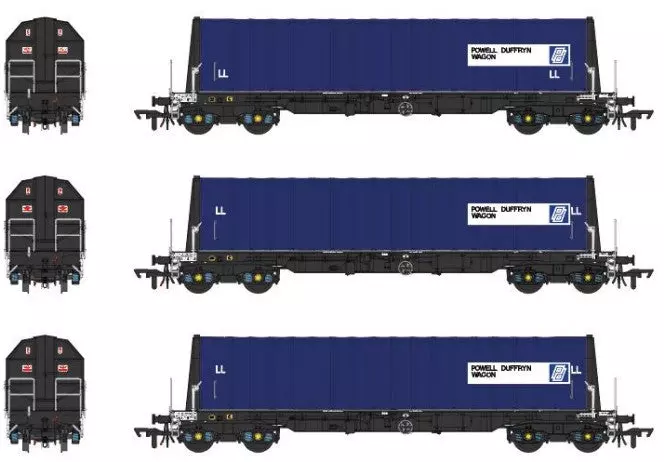Manufacturer catalogue image - please note that pre-release images may be CAD renders or CGI images rather than photographs
Prototype Era
Era 9 (1995 to 2004) Initial Privatisation
Manufacturer description
Specification:
• A wealth of separately fitted parts
• Fully detailed underframe
• Authentic tarpaulin
• Pivoted split chassis
• Prototypical fully detailed replica bogie
• Era specific printing and livery elements
• Designed for easy conversion to EM and P4
• Zinc alloy chassis
• Sprung buffers
• Sprung kinematic NEM couplings
In 1986 Powell Duffryn started building a fleet of fifty-four (54), 101 tonne Gross Laiden Weight, Steel Coil Carrying wagons. These wagons consisted of a solid frame with a ribbed moveable tarpaulin cover to protect the product inside. The Floor of the wagon could house coils loaded eye to the sky or eye to the end depending on where the train was loaded and the destination for discharge. The 54 wagons gained the carkind code on British Rail’s Total Operations Processing Systerm or TOPS, as PXA with design codes of PX044A and PX044B. Powell Duffryn hired the wagons to British Steel to bolster its existing fleet of hired in wagons that the company had on long-term hire from VTG.
The wagons entered squadron service in 1986 operating out of the South Wales steel making plants at Port Talbot, Trostre, Llanwern and Ebbw Vale. The product conveyed in the wagons was either rolled tinplate or cold reduced steel coil. The cold reduced steel coil was initially transported to receiving plants at Dee Marsh, Round Oak, Brierley Hill and Swindon. In some cases, the tin plate would be combined with the Round Oak trains with the tinplate being dropped off at the Metal Box Company private siding at Worcester and the other PXA’s loaded with tinplate used the Speedlink Network to serve other Metal Box sites at Wisbeach and Carlisle. Later, both these locations were served by detaching wagons off of the Railfreight Metals services from South Wales to Scotland and Whitemoor respectively. In 1989, the Poole based Shipper and Shipping agent John Carter hired five of the wagons for the movement of cold reduced coil from Hamworthy to Swindon to supply the automotive industry.
At the change of the decade from the 1980s to the 1990’s, a number of internal changes had occurred at British Steel and this sadly saw the plant at Ravescriag closed which caused a reduction in volume from South Wales to Scotland and Dee Marsh as a result. Following the reduction in traffic and demand, the wagon fleets were adjusted and wagons that were on hire were in turn leased back to the wagon owners. The current owners did find new work for a small number of the PXA’s that were off lease with the wagons being employment on traffic out of Boston and Kings Lynn Docks bringing in imported steel coils to West Midlands steel terminals at Round Oak and Brierly Hill, and Wolverhampton. The Trainload Metals sector was successful in gaining new work with flows to Hull for the movement of steel coils for export to South Africa. This was in addition to another new flow to Fogarty’s Distrubuton at Blackburn. As this new service was not sufficiently large enough to warrant a full trainload, this traffic was moved on booked services via Tees Yard to get the wagons to Blackburn!
As Privatisation loomed and the railway entered the Private Sector, the PXA wagons largely plied the traffic flows in the same way that they had before the three shadow freight companies Load Haul, Mainliine Freight & Transrail had come into being. The majority of traffic flows for the wagons were rooted deep into Transrail’s area of operation and that is how they remained being moved on Transrail services again to Dee Marsh and the West Midland’s outposts of Wolverhampton, Round Oak & Breirley Hill. The traffic to and from Boston had ceased but reopened again when the newly formed English Welsh and Scottish Railway’s won new traffic for the transportation of coil from Boston to Round Oak. Again, the PXA wagons were utilised along with some other private owner covered wagon types with the former providing the back bone of the fleet on that flow. The wagons delivered short-term flows of steel from South Wales to the inland Port of Goole on behalf of the shipper Torr Line. With EWS developing and aggressively marketing its wagonload Network that it had inherited from Transrail, the company along with British Steel; the PXA wagons main leaser, used this network to deliver one-off consignments of coils and also volumes that were less than trainload consignments consisting of coils to various customers all over the UK and Scotland. The wagons continued to work on unassuming as they had done since being built, working core flows for British Steel which itself had now passed into the private sector and had been merged with the Dutch company Koninklijke Hoogovens to become Corus Steel. The PXA’s carried on in traffic until they were eventually replaced by more modern privately owned wagons, this time in the form of IHA wagons. The last PXA wagon remained on TOPS until January 2007.
Catalogue listing
Model details
Special commissions are usually only available new from the commissioning organisation, and may well have sold out on pre-order before they even end up listed here! But you may be able to find used items on marketplace or auction websites.
Supplier links are provided for your convenience and do not guarantee that the product is currently available. RailwayModels.uk is not a representative of these suppliers, but may receive a commission when purchases are made through links on this page.
